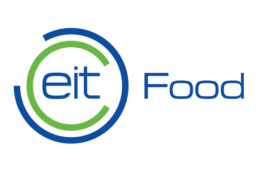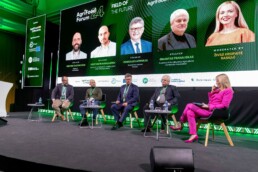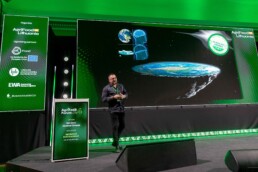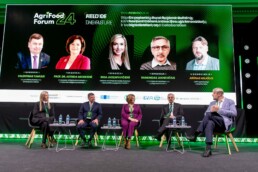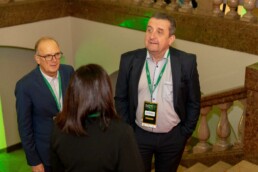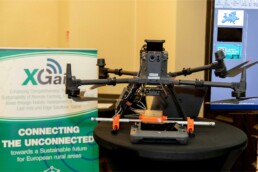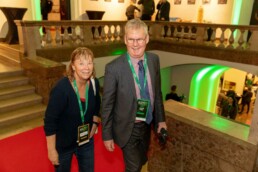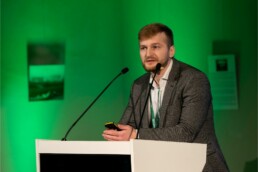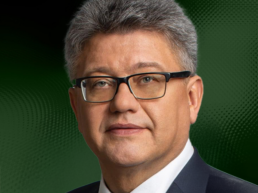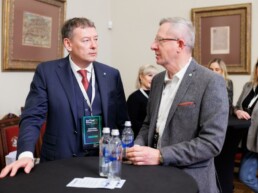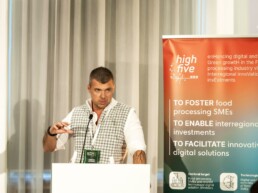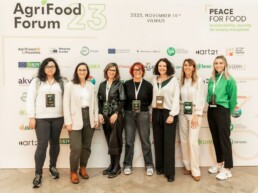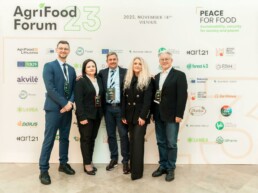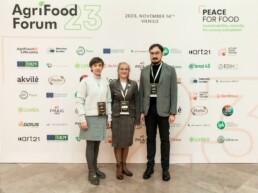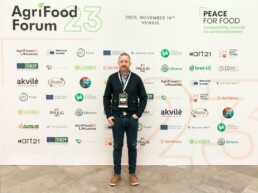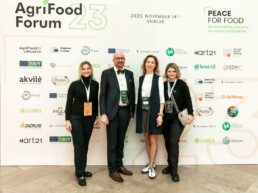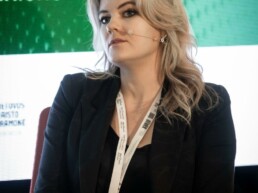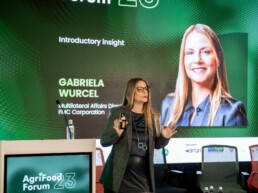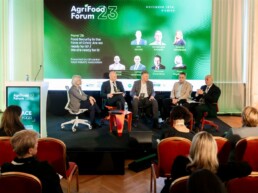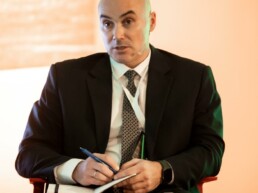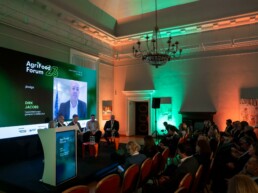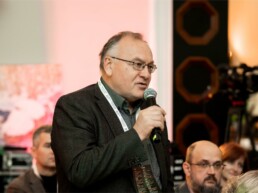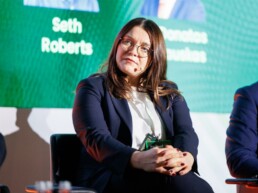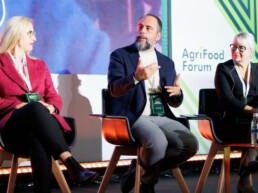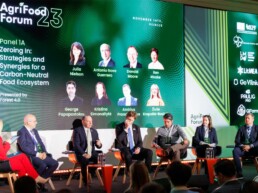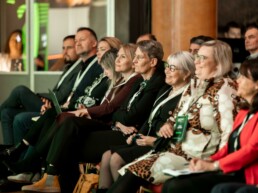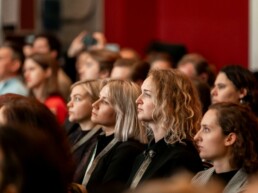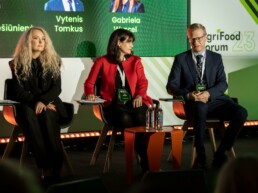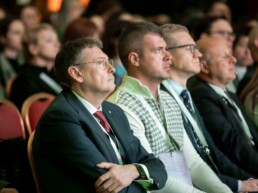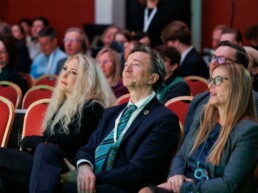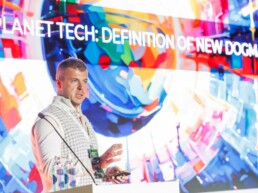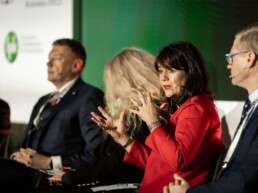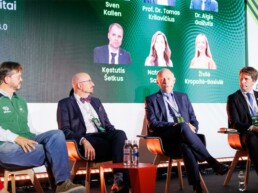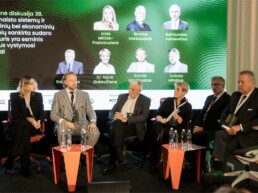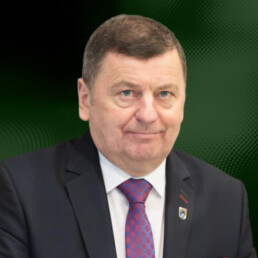AI and Innovation for Sustainable AgriFood sector: Building Resilient and Competitive Regional Ecosystems through Business Collaboration
Setting the scene
The AgriFood Forum 2024 takes place during a pivotal time when the global agrifood sector faces unprecedented challenges, including climate change, food insecurity, geopolitical instability, and rising production costs. The forum’s theme, FIELD OF THE FUTURE: Rethinking AgriFood for Resilience and Sustainability, captures the need for transformative approaches to tackle these issues head-on.
Digitalization, technological innovation, and sustainable practices are becoming indispensable tools for addressing the complexities of modern agrifood systems. By merging traditional knowledge with new technologies, we can overcome the challenges of feeding a growing global population while preserving the environment. The Field of the Future initiative has shown that embracing cutting-edge innovations such as AI, blockchain, IoT, and new business models can enable agrifood systems to become not only more productive but also resilient, equitable, and environmentally sustainable.
The AgriFood Forum 2024 will bring together agrifoodbusinesses, policymakers, researchers, and technology providers to explore practical solutions and collaborative pathways. Through high-level discussions and cross-sectoral partnerships, the forum will create the way for a sustainable evolution in the agrifood sector. It will explore how to leverage innovation to improve productivity, address resource management challenges, and adapt to a changing climate—all while promoting economic and social inclusivity. This event is set against a backdrop of the EU’s goals of fostering sustainability, digital transformation, and strengthening Europe’s competitiveness, closely aligning with Ursula von der Leyen’s 2024-2029 priorities.
AI and Innovation for Sustainable AgriFood sector: Building Resilient and Competitive Regional Ecosystems through Business Collaboration
Context of the theme
AgriFood Forum 2024 will be centered around the theme of FIELD OF THE FUTURE: Rethinking AgriFood for Resilience and Sustainability, with a strong focus on aligning with Ursula von der Leyen’s set 2024-2029 priorities. This aligns with the EU’s goals of fostering sustainability, digital transformation, and strengthening Europe’s competitiveness in the global market.
The forum aims to explore how cutting-edge technologies and innovations, including artificial intelligence (AI), blockchain, IoT, digital tools, and new business models, can reshape the agrifood sector to tackle pressing challenges like climate change, food security, and resource management. By embracing both digital and non-digital innovations, the event will demonstrate how advanced technologies and innovative approaches can make agrifood more productive, resilient, and sustainable.
In addition, the event will foster business-to-business (B2B) collaboration, creating opportunities for agrifoodbusinesses, tech innovators, financial institutions, and policymakers to develop resilient and sustainable food systems. The forum will act as a hub for exchanging insights, facilitating partnerships, and sharing success stories from start-ups and new innovation ecosystems in agrifood development.
Key Features:
- AI-Powered Smart Farming and Food Processing:
- This feature will explore how AI and innovative technologies are optimizing farm productivity, enhancing food processing, and enabling data-driven decision-making. The focus will be on how these technologies can help manage climatic and generic resources, reduce environmental impact, and implement smarter business models for a more sustainable and resilient agrifood future.
- Circular Economy and Sustainable AgriFood Value Chains:
- The forum will discuss how innovative practices and technological tools are driving sustainability by reducing waste, enhancing resource efficiency, and improving traceability in the agrifood value chain. It will also explore the role of innovative business models in promoting the circular economy and optimizing resource use to achieve greater sustainability.
- B2B Networking and Cross-Sectoral Collaboration:
- Networking sessions and matchmaking opportunities will allow stakeholders to form partnerships that drive innovation and support regional ecosystems. Emphasis will be placed on cross-sectoral partnerships to create a supportive environment for both technological adoption and non-digital innovations, thereby enhancing competitiveness and resilience in agrifoodbusinesses.
- Inclusive Innovation and Capacity Building:
- Inspired by the Field of the Future initiative, AgriFood Forum 2024 will include sessions on broadening access to innovation to ensure inclusivity. The event will highlight strategies for improving infrastructure and capacity-building initiatives that enable all food value chain stakeholders, especially farmers, to benefit from new innovations. Panels will focus on building skills necessary for effectively using advanced technologies and innovative approaches.
- Empowering Women in Agriculture and Food Sector:
- The forum will feature a special focus on women-led innovations in the agrifood sector, highlighting participants from the EIT FOOD EWA (Empowering Women in Agrifood) program as well as the Grassceiling initiative, which will demonstrate ongoing results. This feature will emphasize the role of women entrepreneurs in driving sustainable, inclusive transformation and contributing to the overall innovation ecosystem in the agrifood sector.
- Policy Development for AgriFood Innovation:
- AgriFood Forum 2024 will contribute to developing strategic recommendations aimed at facilitating innovation in the agrifood sector. This will include promoting a Regional and National Digital and Innovation Strategy for AgriFood, which ensures coherence across regulatory frameworks, simplifies bureaucratic processes, and fosters innovation to build a thriving and competitive agrifood sector.
- Building Resilient and Competitive AgriFood Systems:
- Discussions will focus on building resilient regional ecosystems through both technological and innovative approaches. Emphasis will be placed on strengthening value chain relationships, enhancing communication between stakeholders, and fostering an environment that encourages data sharing and collaboration to enhance resilience and efficiency throughout the agrifood value chain.
We expect the upcoming AgriFood Forum to yield multiple positive outcomes:
The forum will contribute in the development of strategic recommendations for policymakers, focusing on promoting National and Regional Digital and Innovation Strategies for the agrifood sector. These recommendations will aim to ensure coherence across regulatory frameworks, simplify bureaucratic processes, and create an enabling environment that fosters the adoption of sustainable technologies and practices.
The forum will drive collaboration among government bodies, businesses, and civil society to support the digital and innovation transformation of agrifood. Participants will establish frameworks for cross-sectoral partnerships that emphasize building resilient regional ecosystems and a more coherent public-private response to global challenges in the agrifood sector
By promoting inclusive access to technological and non-technological innovations, the forum will provide pathways for all stakeholders, including smallholder farmers, to benefit from the twin transition. Initiatives will include expanding digital infrastructure in rural areas, capacity building, and encouraging micro-entrepreneurship within the agrifood value chain to support underserved communities.
A special emphasis will be placed on empowering women entrepreneurs through showcasing ongoing successes from the EWA and Grassceiling initiatives. This outcome will underline the role of women-led innovations in driving sustainable change and provide actionable steps to increase female participation in the agrifood innovation ecosystem.
The forum will develop actionable strategies to strengthen value chain relationships, enhance communication between stakeholders, and foster an environment that encourages data sharing, collaboration, and the adoption of new technologies. By focusing on both technological and innovative approaches, the forum will ensure that agrifood systems are prepared to withstand future shocks, adapt to changing conditions, and deliver on sustainability goals.
Participants will gain practical insights into how AI, data science, and other advanced technologies can enhance decision-making, resource management, and efficiency in the agrifood sector. The forum will also address the barriers to adoption and explore how innovation can be scaled up to benefit all stakeholders along the value chain.
Emphasizing the importance of skills development, the forum will provide recommendations for farmer-centric training initiatives that empower stakeholders with the necessary skills to effectively utilize advanced technologies and adopt innovative practices. These initiatives will be designed to address the diverse needs of different farming communities, ensuring that no one is left behind in the transition to a more sustainable agrifood future.
By bringing together policymakers, industry leaders, academics, and innovators, AgriFood Forum 2024 will serve as a catalyst for sustainable change, driving AI-powered solutions and overall innovations, and fostering cross-sectoral cooperation for a more resilient, equitable, and sustainable food future.

Speakers
Christian Holzleitner
Dr. Sjaak (J.) Wolfert
Prof. Dr. Gert Meijer
Andrius Pranckevičius
Kristina Šermukšnytė-Alešiūnienė
Dr. Aistė Balčiūnaitienė
Alicja Krakowska
Elmantas Pocevičius
Prof. Sally Shortall
*The list of speakers will be updated.
 Jury
Jury
Dr. Karolina Trakšelytė-Rupšienė
Dr. Artūras Jakubavičius
 Final event
Final event

Agenda
08:00 - 09:00 Registration & B2B matchmaking breakfast
09:00 - 09:10 Opening remarks
Kristina Šermukšnytė-Alešiūnienė | CEO of AgriFood Lithuania DIH, Vice-President European Clusters Alliance
Marja-Liisa Meurice | Director of EIT Food CLC North-East
Vidmantas Janulevičius | President of the Lithuanian Confederation of Industrialists
09:10 - 10:10 High level opening panel - Shaping the Future: Strategic Pathways for a Resilient and Competitive AgriFood Ecosystems in the regions. The power of the partnerships.
This high-level opening panel will set the stage for the AgriFood Forum 2024, aligning with the theme “FIELD OF THE FUTURE: Rethinking AgriFood for Resilience and Sustainability.” Esteemed speakers will share insights into the critical intersections of sustainability, innovation, and competitiveness in the agrifood sector. The discussion will address:
- The role of strategic partnerships in fostering resilience and sustainability in agrifood systems.
- The European Union’s vision for digital and green transformations in agrifood, emphasizing the alignment with Ursula von der Leyen’s 2024-2029 priorities.
- Lithuania’s leadership in driving industrial innovation and cross- sectoral collaboration, contributing to regional and global competitiveness.
This panel will highlight how collaborative efforts between policymakers, industry leaders, and innovation hubs can transform challenges into opportunities, paving the way for a resilient, inclusive, and sustainable agrifood ecosystem.
Fire starter: Vidmantas Janulevičius | President of the Lithuanian Confederation of Industrialists
Christian Holzleitner | Head of Unit for Land Economy and Carbon Removals, Directorate-General for Climate Action, European Commission
Vidmantas Janulevičius | President of the Lithuanian Confederation of Industrialists
Marius Vaščega | Head of the European Commission’s Representation in Lithuania
Kristina Šermukšnytė-Alešiūnienė | European Clusters Alliance Vice-President, CEO of AgriFood Lithuania DIH
Marja-Liisa Meurice | Director of EIT Food CLC North-East
Moderated by Živilė Kropaitė-Basiulė
10:10 - 11:30 AgriFood at the Policy Table: Selling to Governments and Leveraging Data for Resilient Market Strategies
This panel will bring together thought leaders to discuss the intersection of government engagement, data-driven innovation, and policy alignment in the agrifood sector. The session will focus on how businesses and innovators can effectively collaborate with governments, utilize emerging data platforms to build sustainable and competitive market strategies. With a blend of expertise from policy, data, and industry, this panel will address the evolving frameworks that are shaping the future of agrifood systems.
Objectives:
- Highlight the strategic role of government engagement in fostering growth and innovation in the agrifood sector.
- Explore the opportunities offered by agricultural data spaces, digital tools, and sustainability indicators in shaping policies and improving market dynamics.
- Provide actionable strategies for businesses to align with evolving EU agricultural policies, public procurement, and sustainability goals.
- Foster collaboration between policymakers, data specialists, and industry leaders to create resilient agrifood ecosystems.
Discussion topics:
Government as a Strategic Partner:
- Understanding the landscape of selling to governments: challenges and opportunities.
- Aligning business goals with governmental priorities to secure impactful partnerships.
The Role of Agricultural Data:
- Opportunities in agricultural data spaces.
- Transition from FADN to FSDN: how new sustainability monitoring frameworks can reshape agrifood systems.
- Data-driven decision-making for both public and private stakeholders.
EU Agricultural Policy and Market Dynamics:
- Exploring how evolving EU policies shape opportunities for agrifood businesses in sustainability initiatives.
- Balancing the goals of economic competitiveness and sustainability.
Industry’s Role in Policy Alignment:
- Practical insights from agrifood businesses on navigating government partnerships.
- Bridging gaps between policy frameworks and market needs through innovation.
Fire starter: Alistair Starling | Co-Founder and Managing Director at European Diplomats
Alistair Starling | Co-Founder and Managing Director at European Diplomats
Jekaterina Kalinienė | Innovation Agency Head of Biotech Lab
Andrius Pranckevičius | CEO at Kauno Grūdai, Chairman at Kekava Foods, Deputy Chairman at Akola Group
George Beers | Information Specialist Project manager at Wageningen University & Research
Rokas Morkūnas | Policy Manager of Business at OECD (BIAC)
Moderated by Živilė Kropaitė-Basiulė
11:30 - 11:40 Coffee break
Hall A
Hall B
11:40 - 12:45 PANEL 1A Empowering Rural Regions: Building Resilient Communities through Innovation, Digitalization, and Collaboration
The panel will explore how rural regions can embrace innovation, digital transformation, and collaboration to overcome challenges and unlock new opportunities. With insights from leaders in governance, academia, entrepreneurship, and agriculture, the discussion will focus on practical strategies for fostering sustainable rural development, enhancing rural-urban partnerships, and driving resilience through community-based approaches.
Objectives:
Highlight how innovative initiatives and digital tools can empower rural areas to achieve sustainable growth and connectivity.
- Discuss strategies for building resilient communities through governance, education, entrepreneurship, and agricultural leadership.
- Showcase the importance of bridging rural and urban divides to address shared challenges and leverage collaborative opportunities.
- Inspire action among stakeholders to implement transformative solutions that ensure the long-term vitality of rural regions.
Topics for Discussion:
Local Governance and Rural Development:
- The role of municipalities in promoting sustainability and innovation within rural communities.
- Strategies for fostering rural-urban connections to ensure balanced development and mutual benefits.
Education and Skills for Rural Transformation:
- The role of academic institutions in equipping rural communities with the knowledge and skills needed for sustainable and digital practices.
- How education can serve as a bridge between traditional agriculture and modern technological advancements.
Entrepreneurship and Innovation in Rural Areas:
- Approaches to fostering entrepreneurship and supporting small and medium-sized enterprises (SMEs) in rural regions.
- How innovation and digital solutions can drive economic growth and resilience in rural economies.
Agricultural Leadership in Community Development:
- The pivotal role of farmers and agricultural organizations in shaping sustainable and thriving rural regions.
- How agricultural leadership can influence economic and social vitality in rural communities.
Valentinas Tamulis | Mayor of the municipality of Kėdainiai district
Prof. Dr. Astrida Miceikienė | Chancellor of Agriculture Academy Vytautas Magnus University
Inga Juozapavičienė | Lecturer at Vilnius University Business School, EWA program mentor
Raimundas Juknevičius | Chairman of the Lithuanian Farmers’ Union
Moderated by Arūnas Milašius | Delfi AgriBusiness editor-in-chief
12:45 - 13:00 Connecting Innovations: Showcasing Initiatives Shaping the Future
1. Christine Bertl | Project manager at alchemia- nova research & innovation gemeinnützige GmbH
Irmantas Čepulis | Project Manager AgriFood Lithuania
What is novel Rural-Urban innovation framework, supported by technical and social innovations to enhance territorial governance and existing policy tools. Spotlight on RURBANIVE.
2. Stavros Tsitouras | Partner at reframe.food, will present the open call under the Path4Med project, highlighting opportunities for stakeholders to engage in innovative initiatives aimed at transforming the Mediterranean agrifood sector through sustainability, carbon reduction, and regional collaboration.
13:00 - 14:00 Lunch break
14:00 - 14:25 KEY NOTE. NET ZERO ALCOHOL CHEESE
Gediminas Kvietkauskas | CEO at East West Agro
14:25 - 15:30 Panel 2A Driving Food Systems Transition: The Critical Role of Food Processing and Digital Innovation
The panel will deep dive into the pivotal role of food processing in transforming food systems towards
sustainability and resilience. It will explore how digital and smart technologies enhance efficiency and innovation, address policy implications, and highlight the contributions of food processing to economic
growth and sustainable development. Featuring insights and practical solutions, the session aims to inspire both SMEs and large companies to embrace innovative approaches in food processing.
Panel Objectives:
Highlight the essential role of food processing in transitioning towards a more sustainable and resilient food system.
Explore the impact of digital innovation and smart solutions on enhancing the sustainability and efficiency of food processing.
Discuss policy implications and the need for increased attention to food processing within broader economic and environmental frameworks.
Showcase practical applications and solutions for both SMEs and large companies aiming to integrate innovative approaches in food processing.
Discussion Topics:
Food Processing and Sustainable Development Goals (SDGs): Insights into how food processing contributes to SDGs, with perspectives on creating healthier, environmentally friendly food products.
Health and Sustainability in Product Development: Strategies for making food products healthier and more sustainable, focusing on how processing technologies contribute to these goals.
Digital and Smart Technologies in Food Processing: Case studies and experiences in implementing advanced technologies to optimize product quality and sustainability.
Role of Clusters and Ecosystem Partners: How clusters and partnerships support companies, especially SMEs, in adopting and scaling smart solutions in food processing.
Policy-Level Impact of Food Processing on the Economy: An analysis of food processing’s economic contribution, highlighting its role within the agrifood sector and suggesting policy-level attention for supporting innovation in this area.
Fire starter: Simon Maas | Chairman of SS4AF
Gert Meijer | deputy head Corporate regulatory and scientific affairs at Nestlé and chairman of the European Technology Platform “Food for Life”
Mindaugas Snarskis | CEO at VIKONDA Group
Aiste Miliūtė | CEO at Birstonas Mineral Water
Simon Maas | Chairman of SS4AF
Dr. Gintaras Brazauskas | Director Lithuanian Research Centre for Agriculture and Forestry
Moderator: Kristina Šermukšnytė-Alešiūnienė | CEO AgriFood Lithuania
15:30 - 16:45 Panel discussion 3A Carbon as Currency: Redefining AgriFood for a Sustainable Tomorrow
This panel will examine the innovative concept of using carbon as a strategic asset in transforming the agrifood sector. Bringing together leaders in policy, entrepreneurship, and sustainable practices, the discussion will focus on how carbon management can drive economic growth, enhance sustainability, and position the agrifood sector as a key player in the global green transition.
Panel Objectives:
- Explore the role of carbon management in advancing sustainability and resilience within the agrifood sector.
- Showcase innovative business models and entrepreneurial solutions for integrating carbon reduction and sequestration into agrifood practices.
- Highlight the alignment of EU policies and green initiatives with industry needs and opportunities for collaborative action.
- Inspire stakeholders to adopt scalable solutions that balance profitability with sustainability.
Discussion Topics:
Policy Frameworks for Carbon Management:
- Insights into EU strategies for land economy and carbon removals.
- Opportunities for the agrifood sector to align with climate action goals.
Innovative Carbon Solutions in AgriFood:
- How businesses are leveraging carbon as an economic driver.
- The role of digital tools and technology in carbon traceability and optimization.
Entrepreneurial Impact on Carbon Programs:
- Case studies from leading innovators
- Challenges and opportunities in scaling carbon solutions within agrifood ecosystems.
Bridging Policy and Practice:
- The importance of green advocacy and practical approaches to integrating carbon strategies.
- How policy, innovation, and business collaboration can create actionable roadmaps for the agrifood sector.
Fire starter: Grigoris Chatzikostas | Partner at reframe.food
Grigoris Chatzikostas | Partner at reframe.food
Konstantin Haralampiev | Co-founder of Agrovar CC, a leading figure in the company’s carbon
Remigijus Lapinskas | Green Policy Institute Director
Eimantas Pranauskas | President of the Lithuanian Agricultural Companies Association
Moderated by Živilė Kropaitė-Basiulė
16:45 - 16:50 Concluding session
10:30 - 11:30 PANEL 1B EWA Opening panel discussion. Empowering Women in the AgriFood Sector: Driving Innovation and Sustainability
The panel will spotlight the critical role of women in shaping the future of the agrifood sector, focusing on their leadership in driving sustainable and innovative solutions. With an emphasis on overcoming gender barriers, fostering inclusivity, and enabling women-led initiatives, the discussion will highlight actionable strategies to empower women entrepreneurs and leaders. The session will also explore how supportive policies and financial resources can catalyze innovation and sustainability in the agrifood ecosystem.
Objectives:
Showcase the leadership and innovation of women in the agrifood sector, emphasizing their contributions to sustainability.
Discuss strategies for addressing gender inequities and fostering inclusivity in the agrifood value chain.
Highlight the role of policy and financial frameworks in empowering women-led ventures and supporting innovation.
Inspire collaboration and action to create an enabling environment for women entrepreneurs and leaders in agrifood.
Topics for Discussion:
Leadership and Innovation in AgriFood:
- Success stories of women leaders driving impactful and sustainable agrifood solutions.
- How women’s leadership is transforming traditional practices and fostering innovation in the sector.
Overcoming Gender Barriers:
- Identifying challenges faced by women in agrifood, including cultural, structural, and financial barriers.
- Strategies and best practices for reducing gender inequities and supporting inclusivity at all levels.
Fostering Women-Led Innovation:
- The role of supportive policies, funding mechanisms, and mentorship in enabling women-led ventures.
- Opportunities for collaboration to accelerate innovation and create lasting impact in agrifood sustainability.
Fire starter: Kristina Šermukšnytė-Alešiūnienė | CEO AgriFood Lithuania, Vice-President European Clusters Allance
Kristina Šermukšnytė-Alešiūnienė | CEO AgriFood Lithuania, Vice-President European Clusters Allance
Prof. Professor Sally Shortall | FAcSS, Duke of Northumberland Chair of Rural Economy, Centre for Rural Economy, School of Agriculture, Food and Rural Development, Newcastle University
Alicja Krakowska | Project Manager – Empowering Women in Agrifood (EWA) Programme European Institute of Innovation & Technology (EIT) Food
Daiva Jakaitė | Head of European Parliament Liaison Office in Lithuania
Moderated by Donatas Staniulis | Head of Business Development at Caszyme
11:40 - 12:45 PANEL 2B Pathways to Sustainability: Bioeconomy, Regenerative Practices, and Innovation for Quality Food Systems
The panel panel will explore diverse approaches to achieving sustainability in the agrifood sector, emphasizing bioeconomy strategies, regenerative agricultural practices, and innovative solutions. The discussion will address the challenges of greenwashing while focusing on authenticity and accountability in achieving sustainable outcomes. Expert perspectives will highlight actionable strategies for businesses, policymakers, and stakeholders to create high-quality food systems that align with environmental and social goals.
Objectives:
Highlight the potential of bioeconomy and regenerative agriculture to reshape agrifood systems sustainably.
Discuss the role of innovative technologies, including digital tools and big data, in enhancing transparency and efficiency.
Address the issue of greenwashing and provide frameworks for achieving genuine, measurable sustainability in agrifood practices.
Explore policy and legal perspectives to support sustainability goals, ensuring compliance and fostering trust.
Inspire cross-sectoral collaboration among businesses, policymakers, and researchers to achieve transformative sustainability.
Discussion Topics:
Bioeconomy and Regenerative Practices:
- The role of bioeconomy strategies in reducing environmental impact and optimizing resource use.
- Practical applications of regenerative agricultural practices to enhance soil health and ecosystem resilience.
Legal and ESG Frameworks for Sustainability:
- Insights into regulatory challenges and opportunities for businesses aiming to adopt sustainable practices.
- How ESG (Environmental, Social, Governance) compliance can drive accountability and credibility in the agrifood sector.
Digital Innovation and Big Data:
- Leveraging digital tools and big data for monitoring, traceability, and sustainability reporting in agrifood systems.
- Case studies showcasing the integration of digital innovation to enhance efficiency and quality in food production.
Greenwashing vs. Authentic Sustainability:
- Identifying and avoiding greenwashing practices in the agrifood sector.
- Strategies to ensure measurable, verifiable outcomes that align with sustainability goals.
Policy and Collaborative Approaches:
- How European policies and Horizon Europe projects can support sustainable innovation in agrifood.
- The importance of partnerships between legal, business, and research stakeholders to scale effective solutions.
Fire starter: Vilma Sabaliauskienė | Widen Partner / Attorney at Law / Head of Environmental and ESG Practice
Vilma Sabaliauskienė | Widen Partner / Attorney at Law / Head of Environmental and ESG Practice
Dr. Sjaak (J.) Wolfert | Theme Ambassador and Strategic Senior Scientist on Digital Innovation in Agri-Food Wageningen Economic Research, Wageningen University & Research
Virginija Lukšienė | Director EKOAGROS
Mindaugas Maciulevičius | Director of the Lithuanian Farm Quality Agricultural Cooperative
Krešimir Kovač | Project Manager, Senior Expert at DIH Agrifood Croatia
Moderated by Živilė Kropaitė-Basiulė
12:45 - 13:00 Connecting Innovations: Showcasing Initiatives Shaping the Future
Matas Budriūnas | Project Manager AgriFood Lithuania
We will showcase the FARMTOPIA project, a groundbreaking initiative driving sustainability in agrifood through bioeconomy strategies, regenerative practices, and innovative solutions. FARMTOPIA exemplifies the transformative approaches needed to build high-quality, sustainable food systems.
13:00 - 14:00 Lunch break
14:00 - 14:25 HALL A. KEY NOTE. NET ZERO ALCOHOL CHEESE
Gediminas Kvietkauskas | CEO at East West Agro
14:25 - 15:30 EWA Program Pitch Session: Showcasing Women-Led Innovations in AgriFood
This dynamic session will feature 10 promising startups from the EWA (Empowering Women in AgriFood) Program, each presenting their innovative solutions to challenges in the agrifood sector. Each startup will have 4 minutes to pitch their business idea, followed by a 4-minute Q&A session where investors and industry experts will provide feedback and insights.
The session offers a unique platform for these women-led ventures to showcase their groundbreaking ideas, gain valuable feedback, and connect with potential investors and collaborators. It highlights the role of women entrepreneurs in driving sustainable innovation and fostering transformation in the agrifood ecosystem.
- Urtė Raubytė: Protective nanocoatings for extending fruit and vegetable shelf life “Green Coat”
- Viktorija Šiukščiūtė: Sustainable microgreens farm “HydroGreen”
- Inga Matulytė: “Fruleba” – a bite of healthy energy
- Ugnė Dirdaitė: Millet milk “MillQ”
- Agnė Vaitiekūnaitė: Innovative product development of Haskap.lt assortment
- Paulina Jonutė: Natural dairy products “Jonučių pieno ūkis”
- Aistė Leonaitienė: Birch sap syrup “Laimybė”
- Greta Budreikė: Alternative proteins from crickets “Tastik”
- Božena Lazovska: Goat milk cheeses
- Ingrida Kuprevičiūtė: a flaxseed decoction supplement for reducing stomach ailments “Balsamum gastricae”
Moderated by Greta Zajančauskaitė | Life Sciences Investment Advisor at Invest Lithuania
15:45 - 16:45 Panel discussion 3B Unlocking Potential: Lessons Learned and Opportunities for Scaling Women-Led AgriFood Ventures
The panel will focus on the practical experiences and insights gained through supporting women-led businesses in the agrifood sector. Rather than highlighting general leadership themes, the discussion will center on actionable lessons learned from real-world challenges and the specific strategies that have enabled women entrepreneurs to scale their ventures. The panel will also explore emerging opportunities for growth, sustainability, and innovation, offering valuable advice on navigating the complexities of the agrifood market and building resilient businesses.
Objectives:
Share real-world lessons learned from mentoring and supporting women entrepreneurs in the agrifood sector.
Identify opportunities to scale women-led ventures through innovation, sustainability, and collaboration.
Provide practical strategies to overcome challenges and access resources, including funding and networks.
Inspire women entrepreneurs to leverage mentorship and partnerships to unlock their potential in agrifood markets.
Topics for Discussion:
Lessons Learned from Mentorship and Support:
- Insights into the specific challenges faced by women-led ventures and the strategies used to overcome them.
- The impact of mentorship in building confidence, resilience, and strategic thinking.
Opportunities for Scaling and Growth:
- Exploring trends and market opportunities for women entrepreneurs in the agrifood sector.
- How funding programs, innovation ecosystems, and networks can accelerate growth.
Innovation as a Growth Driver:
- Practical advice on integrating innovative practices and sustainable solutions to create competitive businesses.
- Examples of how women-led ventures have successfully utilized technology or unique value propositions to scale.
Building Resilient Businesses:
- Strategies to adapt to challenges in dynamic markets and create lasting impact.
- The importance of fostering partnerships and collaboration for sustained success.
Jolanta Kuzminienė | Director of Varėnos pienelis
Gintarė Alčiauskienė | Director of Sibena UAB
Ignas Šlapkauskas | EIC Programme Manager, Lithuanian Innovation Centre
Algirdas Augustinas | Commercial Director of Vikeda
Elmantas Pocevičius | CEO of Švenčionių Vaistažolės & Acorus Calamus, Head of R&D Department at Vision DEM4 Laboratory, lector at Vilnius University
Moderated by Arūnas Milašius | Delfi AgriBusiness editor-in-chief
16:45 - 16:50 Concluding session Hall A
Hall C
11:30 – 11:45 Grass Ceiling Project
Opening remarks by Sally Shortall | Grass Ceiling Project Coordinator
11:45 – 12:45 Presentation from the Grass Ceiling project partners on latest results and insights:
- WP1: Mega trends and foresight on rural women led innovation, Vida Dabkienė and Tomas Balezentis
- WP2: Incentives and obstacles towards women’s participation in innovation, Valentina Materia and Natasa Bokan
- WP4: Benchmarking agricultural and rural policies against gender inclusivity, Charlene Lambert and Sally Shortall
Followed by Q&A
13:00 - 14:00 Lunch break
14:00 – 15:30 WP3: Living Labs
- 1st year of operation of the living labs
- Role of living labs in driving solutions of societal and cultural challenges
- Innovator Journey (pecha kucha presentations)
- Women Innovators:
- Croatia
- Ireland
- Italy
- Lithuania
- Norway
- Scotland
- Spain
- Sweden
- The Netherlands
15:30 – 16:30 WP5: Grass Ceiling Policy Forum
Blanca Casares Guillén
16:30 – 16:45 Closing remarks
Sally Shortall | Grass Ceiling Project Coordinator
16:45 - 16:50 Concluding session Hall A
Side events

C2Lab - Vilnius, Lithuania
Lithuania, 14 November 2023 - 15 November 2023
Are you preparing your next project on sustainable agri-food value chains? Or on skills and empowerment? Would you like to expand your network and meet new collaboration partners? Then, C2Lab is the right place for you!

Welcome to B2B matchmaking at the AgriFood Forum 2023
Lithuania, on November 14th, 2023
Enterprise Europe Network partners in Lithuania are organizing an on-site B2B matchmaking event during the AgriFood Forum 2023 in Vilnius, Lithuania, on November 14th, 2023.





